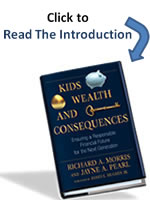
March 6, 2010 By Henry Krasnow
![]()
Kids, Wealth, and Consequences: Ensuring a Responsible Financial Future for the Next Generation
By Richard A. Morris and Jayne A. Pearl
The title tells it all-- this book is about the complicated challenges facing wealthy parents who hope to raise and motivate their children to be responsible adults living worthwhile lives, as opposed to trust-fund babies who unwittingly become stars of their own tawdry reality TV shows.
The need for the many insights contained in this valuable book is that the joyous event of the sale of family businesses for an unimaginably large amount (as occurred to one of the authors) is often the beginning of serious problems that are more complicated to deal with than the business itself. Ironically, there is a vast difference between being the owner of a valuable business and being the owner of a great deal of liquid assets. People who knew they were wealthy but had no liquidity, often find themselves in a situation that many are not be prepared to handle. Preserving their now liquid wealth is far different, and surprisingly more complicated, than successfully running their business. Many have learned that the best way to make a small fortune is to start with a large fortune and go into the business of preserving and investing private equity.
Added to the problems of managing newly liquid assets is the common confusion about what to tell their children and how much access their children should be given to the money they will eventually inherit.
The challenges are real and they have very serious consequences. Regardless of one’s politics, if given a choice, everyone would rather their children grow up to be John F. Kennedy and not a cocaine-addled professional partygoer in Los Angeles.
Kids, Wealth, and Consequences is a well thought out, clear and readable book that provides valuable insights into the unique challenges faced by wealthy parents in raising their children and the tools with which these challenges can be successfully faced.
The book is divided into four logical sections.
The first, “Financial Choices”, deals at length with the long-term financial implications of the choices that are made with regard to lifestyle. It speaks little about the problems of raising children, but contains valuable information about how parents and their children must make choices to limit their lifestyles if preserving wealth over generations is their goal.
The second section, entitled “Intellectual Choices”, deals with the challenges of how to assist children in reaching financial literacy and developing the skills and experience necessary to avoid falling prey to the many people (some honest and some not) who want to use other people’s money and have developed the skills to obtain it.
“Spiritual/Emotional Choices”, the third section, discusses the differences between success and happiness and provides insights as to how to achieve both. Although there are many snide or glib clichés about money (“Rich or poor, it’s good to have money”), all contain some kernel of truth. But the fact remains that one cliché is always true – “Money cannot buy happiness”. Raising children who are able to be happy is not easy for anyone and having a lot of money does not make this challenge any less daunting.
The final section, “Integrating Your Choices”, talks about exactly that – how to pull together all the information from the prior sections.
Kids, Wealth, and Consequences not only identifies and discusses problems, it offers process through which each family can find solutions that fit their personalities, their family values and their relationship with their children. One especially valuable aspect of the book is that each section starts with a self-survey that allows the reader to evaluate his or her own views on the subject, both before and after they have read the ensuing chapters.
Unlike many books, this one does not offer a secret formula or a “one size fits all” road map to raising healthy, happy children, while preserving wealth. The authors wisely avoided “preachy” suggestions about parenting, inapt allusions to how they did it “right” or simplistic bromides as to how to make your children feel loved and secure. Instead, it handles the sometimes-conflicting goals of preserving wealth while raising happy, self-sufficient children by offering suggestions as to strategies that can be adopted and ideas as to how to accomplish individualized plans.
In reading this book I was reminded of a lunch conversation with a very old dear friend-- a very bright and energetic man whose demeanor virtually defines the word ebullient. He told me about a conversation with his adult daughter, a woman who, after graduating from a prestigious ivy-league college, successfully graduated from its law school and after being a lawyer in Paris, married and returned to the United States with her husband and their young child. As my friend told the story, his daughter said, “Dad, I want to make you a deal. You worry about how to make yourself happy, and I’ll worry about how to make myself happy, and we’ll get along much, much better.”
One of the major challenges of any parent comes when they must acknowledge that their adult child knows best what will make him or her happy and the relationship with their parents invariably depend on their parents respecting those choices. For many, one of the “problems” of having money is the parent’s goal of having the money spent or not spent as the parent wants while dealing with the need to let their children decide for themselves what will make them happy.
Kids, Wealth, and Consequences does not solve this, or any other, problem. But, for anyone with an open mind who is concerned about struggling with this problem for themselves, it offers many valuable insights and strategies for reaching a wise and thoughtful solution.
Henry C. Krasnow
Krasnow Saunders Cornblath LLP.
500 N. Dearborn St.
Suite 200
Chicago, Illinois 60654
312-755-5700
www.ksc-law.com

